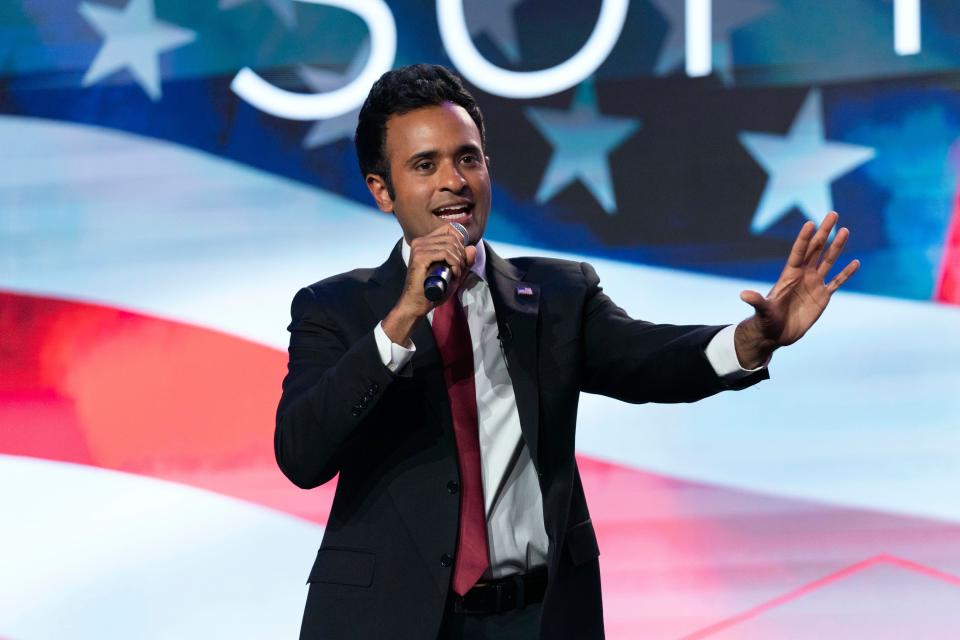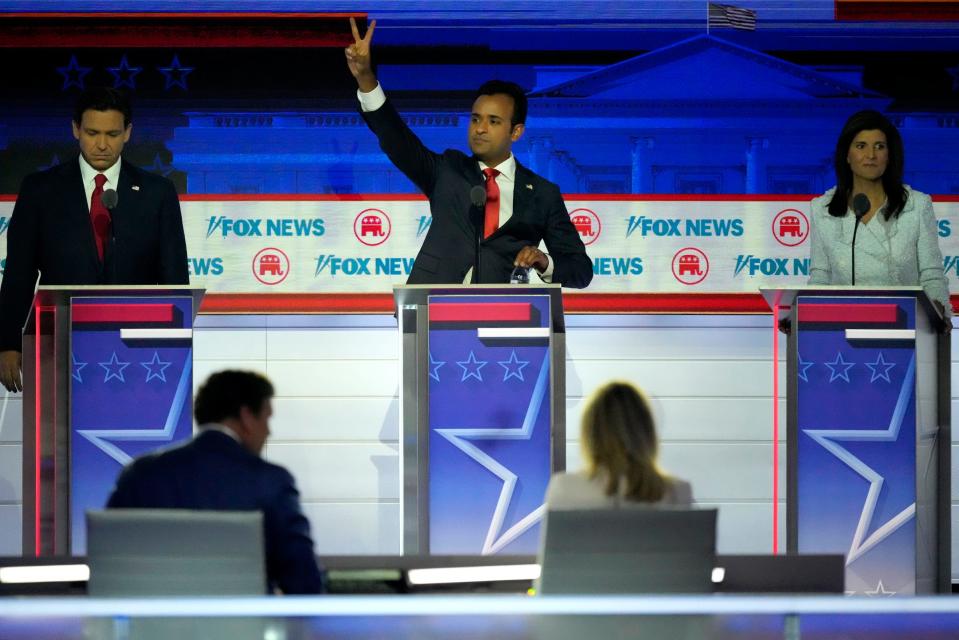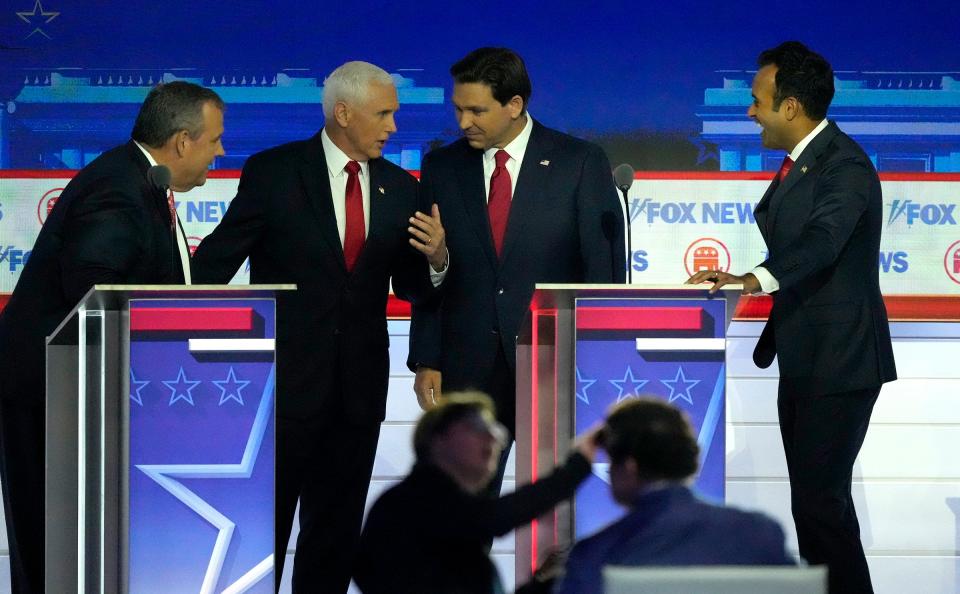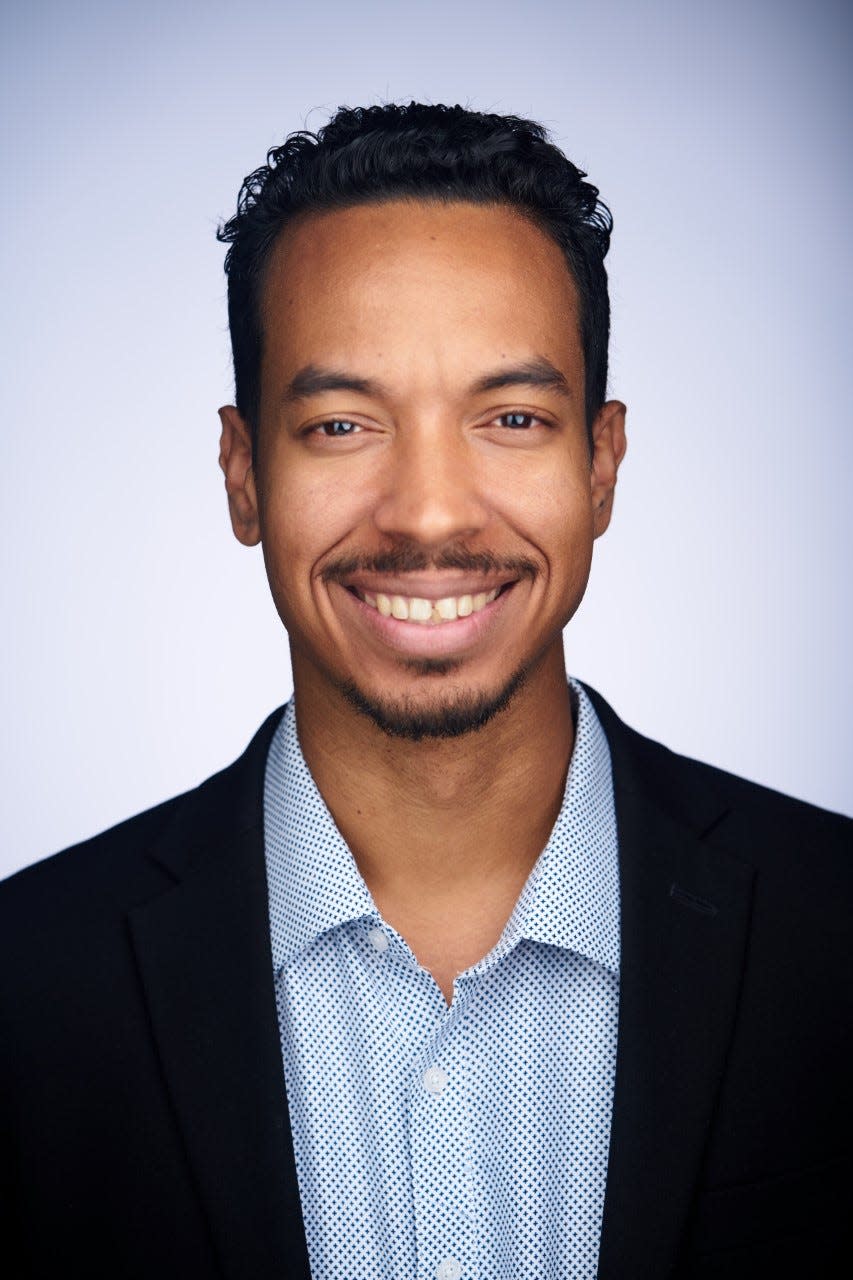Does Vivek Ramaswamy really want to unite Americans? If so, he needs to confront Trump.
- Oops!Something went wrong.Please try again later.
- Oops!Something went wrong.Please try again later.
Most politicians run for office saying they want to bring the American people together. Typically, it is an obligatory sentiment. And when presidential candidates say they want to bridge the political divide, I take it with an iceberg’s worth of salt.
Yet, America desperately needs uniting. For those of us who recognize that fact, Republican presidential candidate Vivek Ramaswamy is someone who should be noticed.
Ramaswamy deserves credit for making unity a centerpiece of his campaign. But if Ramaswamy is to be taken seriously in his calls for unity, he must speak seriously to the deeper reasons why Americans are divided. This includes the role played in our national unraveling by the man he lauds above all others: former President Donald Trump.
“I care deeply about national unity,” Ramaswamy told a gathering of voters at a town hall event in New Hampshire. “I also want to get to the heart of how we unite this nation. And some people think … the way you’re gonna unite this country is by showing up in the middle: Hold hands, compromise, sing 'Kumbaya' and somehow we’ve united this country. Doesn’t work that way."
'Embracing the radicalism of the American Revolution'
Ramaswamy then gave his recipe for national unity: “I think the way we’re going to actually unite this country is by rediscovering the radical ideals that unite all of us as Americans. See, it is not through moderation; it is through embracing the radicalism of the American Revolution. It was a radical idea that you're free to speak your mind as long as I get to in return. … The idea that we the people ... could be trusted to govern ourselves, that was a laughable idea. … For most of human history, it was done the other way. We do it differently on this side of 1776.”
What Ramaswamy introduces as radical is the classical liberalism that Democratic and Republican politicians have articulated, with different areas of emphasis, across the entirety of our history.

It is only natural for a presidential candidate to try to unite us by leaning on ideals that have historically done so. Ramaswamy gives a radical presentation to an ordinary message. But this ordinary appeal to the historic values that unite is still a good thing. These are not values we should wish to lose in America.
Nonetheless, the not-so radicalism of this gifted political newcomer is vulnerable to a charge of deep naiveté.
Ramaswamy in effect argues that the values that will unite us are the values that have always united us. But the moment we are in as a nation is defined by a perilous decline in our confidence in our founding ideals in the first place.
Increasingly, we either do not believe in them the way we used to, believe the narrative surrounding our founding ideals is false, or we do not believe that they are enough to unite us in an era where our differences have become more profound than they were in the past.
Ramaswamy needs to address why Americans are losing faith in founding ideals
If Ramaswamy is truly serious about uniting America, the first thing he must do is address the reasons why the values of 1776 are steadily losing their power to bind us in 2023.
Left and right, it is clear that they are.
For generations, American presidents have appealed to the blessings of liberty, the words of the Declaration of Independence, and the heritage of freedom and self-government in America that Ramaswamy rhetorically at least seeks to revive.
Two presidents, however, stand out as exceptions, at least in their inaugural addresses. Those are our most recent presidents: Donald Trump and Joe Biden.
Politicians' age is bipartisan problem: Romney models graceful exit for Biden and Trump
Whereas Ronald Reagan, George H.W. Bush, Bill Clinton, George W. Bush and Barack Obama all delivered inaugural addresses that made clear reference to liberty, the Declaration of Independence and our founding values, Trump and Biden did not or scarcely did.
In setting the tone for his new administration, Trump made no reference to liberty and no reference to the philosophical heritage of the United States. Instead, he made clear his intention to root out the power of the Washington establishment he viewed as responsible for a decline in our nation’s power and prosperity, which he decried as “American carnage.”
It was a speech focused on defeating the enemies of the public, giving power to the people, but one that was utterly unconcerned with emphasizing the virtues and responsibilities that come with the project of self-government.
Biden, for his part, delivered an inaugural address focused, as Ramaswamy is focused, on achieving national unity. But in appealing to unity, Biden made but scant mention of liberty and no mention of the American founding.
He did, however, emphasize the need for racial justice, decrying white supremacy and the “sting of systemic racism” in a speech calibrated to rally the people against the racism and extremism of anti-democratic forces in America. In this context, “unity” was a battle cry.
But it is not just on the presidential level that we see this drift from the nation's founding ideals taking shape.
The intellectual movements that have gained momentum in the Trump and Biden years on the left and the right, the years of Black Lives Matter and MAGA, have been movements that are disenchanted with a classically liberal vision of America.
Opinion alerts: Get columns from your favorite columnists + expert analysis on top issues, delivered straight to your device through the USA TODAY app. Don't have the app? Download it for free from your app store.
For left-leaning thinkers such as Nikole Hannah-Jones, editor and an author of the 1619 Project, America’s founding ideals were “false when they were written,” negated by the reality of white supremacy. For modern anti-racist thinkers generally, the liberal heritage of American society is a veneer meant to conceal the white supremacist character of our society and its institutions − like a shark gliding beneath the surface of the water.
Right-leaning thinkers such as Yoram Hazony, a leader in the emerging movement of national conservatism, downplay ideals such as all people are created equal as a uniting principle. Instead, he prefers to think of America as “a people that is bound together by bonds of similar religion, similar national background, similar laws and tradition, similar language.”
There is a conversation to be had as to why so many Americans, left and right, feel as they do. Millions of Americans, particularly Americans of color, feel that our mainstream institutions do not exist to serve or accept them. Millions of other Americans, meanwhile, believe that their own cultures and families and histories are more real and more important than the shallow pluralism foisted upon them by liberals and conservatives alike.
Ramaswamy must be willing to have that conversation.

Vivek fails to acknowledge Trump's power to divide
Yet, for all of Ramaswamy’s focus on the power of our founding ideals to unite, he pays little attention to the power of a president to divide. At least when it comes to Trump.
In the first Republican primary debate of the 2024 election, Ramaswamy boldly declared that Trump was “the best president of the 21st century.”
Many Americans don't take issue with Ramaswamy or other GOP candidates praising Trump on matters of policy. But Ramaswamy's implicit message is that character is not necessarily a vital consideration for leadership when it comes to electing a president of the United States.
Takeaway from first Republican debate: Do you realize that Vivek Ramaswamy could be the MAGA candidate for Trump lovers?
The claim that Trump sought to upend the Constitution to hold onto power is perhaps the most serious charge, legal and possibly moral, that any president has ever faced. But even that doesn't cover all of the damage that Trump inflicted on national unity.
Trump came to political prominence casting doubt on Barack Obama’s status as a natural born American, and therefore the legitimacy of the Obama presidency. It wasn't only factually wrong. It also was willfully divisive.
From there, Trump launched his campaign with words implying that most Mexican immigrants were criminals and rapists. Those were divisive, cruel and dishonest words as well.
After a blistering campaign of constant insults, Trump offended the memory of American war hero Sen. John McCain when he quickly raised the flag over the White House following McCain’s death, even as the flag still hung at half-staff over Capitol Hill. This was Trump, advertising and exacerbating our divisions for all to see.
Unity cannot come at the price of truth or righteousness
The list of such incidents of course goes on ad infinitum. Is there no meaningful criticism to be made of Trump's leadership style then by a candidate who seeks to build on his legacy in the name of unity?
One fact about unity that I hope Ramaswamy recognizes is that it cannot come at the price of truth or righteousness. Sometimes doing the right thing divides people. But we must never divide Americans for the sake of division, and we must always strive to close the gaps when they have opened. It takes moral courage to do both of these things.
For many Americans, the willingness of former Vice President Mike Pence to defy Trump's will and rage on Jan. 6, 2021, in deference to the Constitution and the peaceful transfer of power was a mark of moral courage.

But when asked on NBC News whether Pence did the right thing in that fateful hour, Ramaswamy answered by saying the former vice president missed an opportunity to unite the American people. He then described what he would have done: Put forward a legislative plan to reform our electoral process, in part by mandating voter ID requirements, in exchange for certifying the results of the election.
Holding the peaceful transfer of power hostage to a legislative victory would not likely have worked. But Ramaswamy misunderstood the true nature of the question: IF you had to choose between the Constitution of the United States of America and the well-being of the American as opposed to the will of Donald Trump and your own popularity, would you have the moral courage to choose the Constitution and the country?
Ramaswamy, in effect, dodged the question.
Ramaswamy is an electric political talent. He has the tools and intellect to be a force for unity in America. Will he apply his gifts to the task? Or is he merely another ambitious man who sees a path to power, willing to avoid the hard questions and the real conversations that might stand in the way of his getting there?
Does Vivek Ramaswamy really want to unite America? I hope the answer is yes.

John Wood Jr. is a columnist for USA TODAY Opinion. He is national ambassador for Braver Angels, a former nominee for Congress, former vice chairman of the Republican Party of Los Angeles County, musical artist, and a noted writer and speaker on subjects including racial and political reconciliation. Follow him on X, formerly Twitter: @JohnRWoodJr
You can read diverse opinions from our Board of Contributors and other writers on the Opinion front page, on Twitter @usatodayopinion and in our daily Opinion newsletter. To respond to a column, submit a comment to letters@usatoday.com.
This article originally appeared on USA TODAY: Vivek Ramaswamy must stop dodging questions about Trump and Jan. 6

